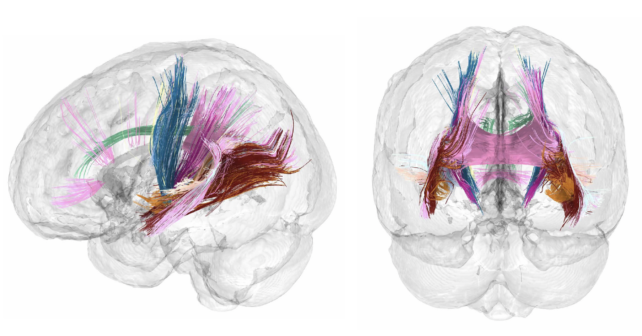The human physique undergoes profound physiological adjustments throughout being pregnant, and the mind isn’t any exception.
Neuroscientists within the US have now offered the primary detailed map of the human mind throughout gestation.
The breakthrough relies on the neurological adjustments of 1 first-time mom, who had snapshots of her mind taken earlier than, throughout, and after being pregnant.
Because the being pregnant superior, researchers observed a widespread shrinking of grey matter, which is the mind tissue that features the our bodies of neurons.
Whereas shrinking elements of the mind may sound scary, these adjustments are in all probability for the very best. They might replicate a re-wiring of the mind’s finite tissue for motherhood.
Researchers discovered the hyperlinks between neurons, which make up white matter, had elevated their connectivity within the closing two trimesters of being pregnant.
When neuronal circuits are fine-tuned for no matter motive, grey matter tends to be pruned again whereas white matter connections improve, permitting info to journey across the mind extra effectively.
Neuroscientist Emily Jacobs from the College of California Santa Barbara compares the method to Michelangelo chipping away at a carving of David. The artist begins with an enormous block of marble, she explains, however by way of cautious honing it turns right into a refined piece of artwork.
“We’ve never witnessed the brain in the midst of this metamorphosis,” Jacobs mentioned in a press briefing.
“We were able to observe sweeping changes in gray matter volume, cortical thickness, white matter microstructure, and ventricle volume as it all unfolded week by week.”

Not so way back, neuroscientists used to assume the human mind was ‘hard-wired’ with fastened circuits of neurons. Now we all know higher. The mind is definitely soft-wired, that means it’s plastic and malleable, present process important adjustments as we study and age.
The concept of plasticity took the sector of neuroscience by storm, and now, one other revolution is on the horizon.
To this point, barely 2 p.c of neuroimaging research point out intercourse hormones as influencing elements, although the few papers which can be printed counsel there’s a statistically important affiliation between intercourse steroids and adjustments within the mind.
In 2024, as an example, researchers documented intimately the structural adjustments that happen within the mind as hormones change throughout menstruation.
However there are solely a handful of research which have investigated what occurs to the mind throughout being pregnant, in response to neuroscientist Elizabeth Chrastil from the College of California, Irvine.
In 2017, researchers confirmed that being pregnant coincided with important reductions in grey matter, and in 2022, a follow-up research amongst 28 volunteers discovered that being pregnant hormones modified the way in which the mind’s networks are wired.
“There is so much about the neurobiology of pregnancy that we don’t understand yet, and it’s not because women are too complicated; it’s not because pregnancy is some Gordian knot,” says Jacobs.
“It’s a byproduct of the fact that the biomedical sciences have historically ignored women’s health. It’s 2024, and this is the first glimpse we have at this fascinating neurobiological transition.”
The brand new MRI research tracked a 38-year-old lady, who had not had youngsters earlier than, and who underwent in-vitro fertilization (IVF) to realize being pregnant.
The feminine participant underwent 26 MRI scans in complete, together with 4 scans three weeks earlier than conception, a number of scans within the first, second, and third trimester, and 7 scans within the two years postpartum. Researchers additionally took blood samples from the participant all through this timeline.
Throughout being pregnant, over 80 p.c of the mind areas that neuroscientists examined confirmed reductions in grey matter of about 4 p.c, on common, though the whole lot returned to regular on the finish of the being pregnant. That is about the identical magnitude of change noticed throughout puberty, the authors say.
How these mind adjustments relate to behavioral adjustments is unknown. All we’ve got in the intervening time are animal research to level to, and the majority of those are performed on male brains.
In pregnant rodents, some research have discovered a surge in estrogen and progesterone reprograms mind circuits just like the hypothalamus, which boosts a mom’s sensitivity to the smells and sounds of her new child pups.
Maybe one thing comparable is occurring in people, though our physiology is extra advanced, and the findings amongst rodents might not relate.
“This paper really opens up more questions than it answers because really we’re just starting to scratch the surface of understanding what does this mean for postpartum depression or… how does pregnancy possibly help alleviate some things like migraines?” says Chrastil.
“This is really just sort of opening up the box.”
The research was printed in Nature Neuroscience.

